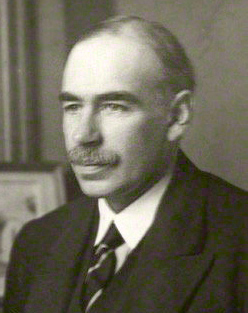Original: «We are being afflicted with a new disease of which some readers may not yet have heard the name, but of which they will hear a great deal in the years to come – namely "technological unemployment". This means unemployment due to our discovery of means of economizing the use of labor outrunning the pace at which we can find new uses for labor».
Fuente: The General Theory of Unemployment, Interest and Money, 1931.
Frases célebres de John Maynard Keynes
Fuente: Ensayos de persuasión.
Fuente: El fin del laisez-faire.
“Los especuladores son una consecuencia y no una causa de los precios altos.”
La especulación financiera
Fuente: Ensayos de persuasión.
Frases sobre la riqueza de John Maynard Keynes
Fuente: Teoría general del empleo, interés y la moneda.
John Maynard Keynes Frases y Citas
La especulación financiera
Fuente: Lords of Finance: 1929, The Great Depression, and the Bankers who Broke the World.
Fuente: Teoría general del empleo, interés y la moneda.
Fuente: Ensayos de persuasión.
Fuente: Teoría general del empleo, del interés y la moneda.
Fuente: Ensayos de persuasión.
La especulación financiera
Fuente: Teoría general del empleo, del interés y la moneda, 1936.
La especulación financiera
Fuente: Teoría general del empleo, del interés y la moneda, 1936.
La especulación financiera
Fuente: Las consecuencias económicas de la paz.
Respuesta a la pregunta: "¿Por qué no me afilio al Partido Laborista?"
Fuente: De su conferencia ¿Soy un liberal?, recogida en Ensayos en persuasión, 1925.
John Maynard Keynes: Frases en inglés
“A study of the history of opinion is a necessary preliminary to the emancipation of the mind.”
Fuente: Essays in Persuasion (1931), The End of Laissez-faire (1926), Ch. 1
Essays in Persuasion (1931), Social Consequences of Changes in The Value of Money (1923)
Fuente: Essays In Biography (1933), Alfred Marshall, p. 223
“Nothing mattered except states of mind, chiefly our own.”
On the Cambridge Apostles of Cambridge University, in Essays in Biography (1933) Ch. 39; also later used in My Early Beliefs, a memoir he read to the Bloomsbury Group's Memoir Club in 1943.
Letter to Abba Lerner, 1942, On The Economics of Control
Essays in Persuasion (1931), Social Consequences of Changes in The Value of Money (1923)
Fuente: Essays in Persuasion (1931), The End of Laissez-faire (1926), Ch. 3
As quoted in The Guardian (8 June 1983). p. 82
Attributed
Fuente: Essays in Persuasion (1931), The End of Laissez-faire (1926), Ch. 2
Fuente: How to Pay for the War (1940), Ch. 3 : Our Output Capacity and the National Income
Fuente: How to Pay for the War (1940), Ch. 7 : The Release of Deferred Pay and a Capital Levy
Fuente: How to Pay for the War (1940), Ch. 1 : The Character of the Problem
“The power to become habituated to his surroundings is a marked characteristic of mankind.”
Fuente: The Economic Consequences of the Peace (1919), Chapter I, p. 3
Fuente: How to Pay for the War (1940), Ch. 5 : A Plan for Deferred Pay, Family, Allowances and a Cheap Ration
Attributed by Sir George Schuster, Christianity and human relations in industry (1951), p. 109
Recent variant: Capitalism is the astounding belief that the most wickedest of men will do the most wickedest of things for the greatest good of everyone.
As quoted in Moving Forward: Programme for a Participatory Economy (2000) by Michael Albert, p. 128
Attributed
Fuente: The Economic Consequences of the Peace (1919), Chapter VII, Section 1, p. 268
Fuente: How to Pay for the War (1940), Ch. 1 : The Character of the Problem
On Georges Clemenceau, in Chapter III, p. 32
The Economic Consequences of the Peace (1919)
Notes after a meeting with Albert Einstein in 1926, The Collected Writings of John Maynard Keynes, Vol. 10, p. 383
Fuente: Essays In Biography (1933), Mr. Lloyd George: A Fragment, p. 35
Fuente: How to Pay for the War (1940), Ch. 1 : The Character of the Problem
published in Manchester Guardian (1922); in Collected Writings, Volume 17, p. 370
Fuente: Essays In Biography (1933), Robert Malthus: The First of the Cambridge Economists, p. 148
“There were endless possibilities, not out of reach.”
Fuente: Essays In Biography (1933), Alfred Marshall, p. 253
Fuente: How to Pay for the War (1940), Ch. 3 : Our Output Capacity and the National Income
Fuente: Essays In Biography (1933), Trotsky On England, p. 91
Fuente: How to Pay for the War (1940), Ch. 1 : The Character of the Problem
A Revision of the Treaty (London: Macmillan, 1922), p. 186
Fuente: The Economic Consequences of the Peace (1919), Chapter II, Section III, p. 19
“Successful investing is anticipating the anticipations of others.”
As quoted in Isms (2006) by Gregory Bergman, p. 105
Attributed
